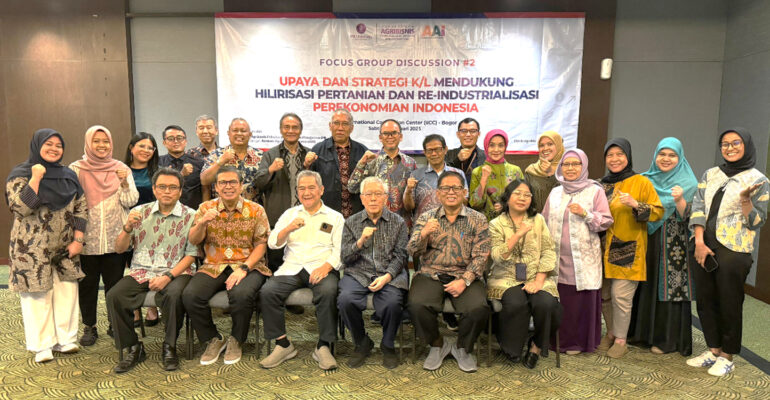IPB University Experts Talk about Agricultural Downstreaming Strategy: The Key to Reindustrializing Indonesia’s Economy

Agricultural downstreaming became the main highlight in the Focus Group Discussion (FGD) organized by the Department of Agribusiness, Faculty of Economics and Management (FEM) IPB University in collaboration with the Indonesian Agribusiness Association (AAI).
This activity is a series of events “80 Years of Prof Bungaran Saragih” which will be held on April 17, 2025.
In opening the discussion, Dr Burhanuddin, Chairman of the Department of Agribusiness at IPB University, emphasized that agricultural downstreaming is a government priority program that must be strengthened through synergy between various stakeholders.
“Downstreaming not only increases the added value of agricultural products, but also creates jobs and accelerates poverty alleviation in rural areas,” he said when opening the FGD at the IPB International Convention Center (IICC).
Similarly, Prof Bungaran Saragih also asserted that downstreaming cannot only depend on the government, but must involve the private sector and farmers as the main actors. “Downstreaming is a modern economic transformation. The government should act as a facilitator, not as the main actor,” he said.
As a discussion starter, Professor of Agribusiness Policy Science at IPB University, Prof Bayu Krisnamurthi explained that downstream is not just industrialization, but also a strategy to get out of poverty for the lower middle class. He emphasized the importance of a welfare distribution strategy from downstreaming so that the benefits are truly felt by the wider community.
Also present was Deputy for Coordination of Social Welfare Improvement at the Coordinating Ministry for Human Development and Culture (Kemenko PMK), Prof Nunung Nuryartono. The professor of FEM IPB University highlighted the importance of downstreaming in reducing poverty in Indonesia.
With 8,57 percent of the population still below the poverty line, the transformation of the agricultural sector through income generation and rural industrialization is a crucial solution.
Downstreaming of Leading Commodities
One commodity that has great potential is seaweed. Widya Rusyanto, Director of Processing and Quality Management of the Ministry of Maritime Affairs and Fisheries (KKP), revealed that Indonesia’s seaweed exports in 2023 reached 265,84 thousand tons with a value of USD 433,72 million. However, major challenges are still faced, such as export regulations, high logistics costs, and traditional post-harvesting.
In the plantation sector, Elvyrisma T Nainggolan, STP, MP from the Ministry of Agriculture highlighted the role of palm oil as the largest contributor to the export of plantation products, reaching 66,27 percent.
Meanwhile, coffee downstreaming is growing with product diversification such as roasted beans and new fermentation methods. Cocoa and nutmeg also have great opportunities to be further developed in the downstream industry.
To conclude, the discussion highlighted the importance of quality human resources, cross-sector collaboration, and regulations that support sustainable downstreaming. With the right strategy, agricultural downstreaming can be the driving force of the national economy, create jobs, and increase the competitiveness of Indonesian products in the global market. (*) (IAAS/RUM)



